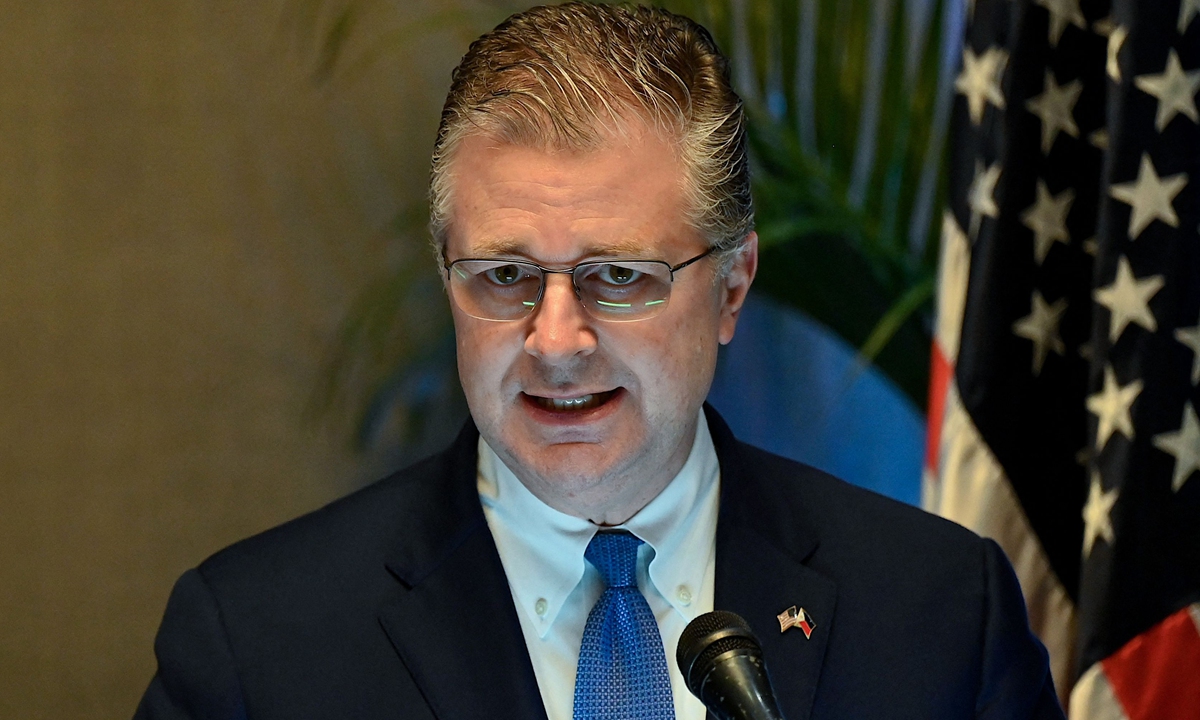
Assistant Secretary of State for East Asian and Pacific Affairs Daniel Kritenbrink Photo: VCG
The US has dispatched its top diplomats for East Asia to China, which analysts see as a move to test China's reactions after it elevated defense relations with Japan and Philippines amid escalating tension in the South China Sea.
According to US Department of State, Assistant Secretary of State for East Asian and Pacific Affairs Daniel Kritenbrink will visit China from Sunday to Tuesday. He will be joined by National Security Council Senior Director for China and Taiwan Affairs Sarah Beran.
The two will meet with Chinese officials as part of ongoing efforts to maintain open lines of communication and to responsibly manage competition, according to the US state department.
Kritenbrink's trip comes days after the first-ever trilateral summit between the US President Joe Biden, Japanese Prime Minister Fumio Kishida and Philippine President Ferdinand Romualdez Marcos Jr in Washington on
Thursday US local time.
The three leaders vowed to enhance military ties, and their joint statement termed China's actions to safeguard its sovereignty as "a dangerous and aggressive behavior" in the South China Sea, and as "attempts to unilaterally change the status quo by force or coercion in the East China Sea," according to media reports.
Reiterating the US' "ironclad" defense commitments to the two Asian countries, Biden said any attack on Philippine aircraft, vessels or armed forces in the South China Sea will invoke our Mutual Defense Treaty against the backdrop of escalating China-Philippine row, CNN reported.
Li Haidong, a professor at the China Foreign Affairs University, told the Global Times on Sunday that the US, after a series of provocative actions targeting China, aims to observe China's reactions and potential countermeasures. If China responds strongly, the US "may restrain itself" to some extent.
Lü Xiang, a research fellow at the Chinese Academy of Social Sciences, told the Global Times that the US is well aware of China's military capabilities in the Western Pacific, and it will not carry out any substantive acts, otherwise it will incur unbearable consequences.
Observers underlined US hypocrisy in its communication with China, particularly on security issues. The US provokes first and when China responds, it makes a "crisis management" gesture as if it were China's fault to have not tolerated those provocations.
The Taiwan question is also on Kritenbrink's agenda. As May 20 approaches when the new regional leader is about to be sworn in, the US does not want "troubles beyond US control" across the Taiwan Straits and seeks to communicate with China in this regard, Li said.
The US is also dreaming of China's assistance and smooth coordination to relieve the US from the pressures of dealing with the lingering Russia-Ukraine crisis and the Middle East conflicts, Li said, but Washington's "ultimate motivation is to better compete with China."
When the US is the actual culprit behind many of the conflicts and crises, its attempts to mediate and de-escalate the situations are very much deceptive gestures, experts said.
Analysts warn that the US should not have any illusions that China could compromise on its core interests and sovereignty.
"China is always open to dialogue with the US on issues of shared concern, but the dialogue should be based on an equal footing and mutual respect, and the promises made between the two sides should be fulfilled," Li said.
US media earlier reported that US Secretary of State Antony Blinken is about to visit China, without specifying the dates. It is believed that Kritenbrink's trip also aims to communicate with China on arrangements for Blinken's trip, and pave the way for more constructive talks.
But before Blinken's visit happens, nothing can be ruled out, Li said, citing the postponement of Blinken's visit for months in 2023 due to the balloon incident.




